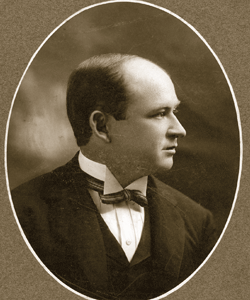As you travel past East Campus on Main Street and glance at the train tracks, you may not know that they were the site of a presidential visit 110 years ago, when Theodore Roosevelt brought his private train to Durham to praise Trinity College.
Roosevelt was first impressed by Trinity College when, in 1903, professor of history John Spencer Bassett wrote an article for the South Atlantic Quarterly, in which he praised leading black educator Booker T. Washington as the greatest man, “save General [Robert E.] Lee, born in the South in a hundred years.” Many members of the public implored the Trinity board of trustees to terminate Bassett. With the support of faculty members and students, the board refused, striking a blow for academic freedom.
In 1905, Roosevelt toured several Southern states, visiting both Raleigh and Durham. He invited Bassett to join him in Raleigh and to ride in the president’s private train to Durham. Stopping just outside the Trinity College gates, in view of the East and West Duke buildings and across from where today’s Smith Warehouse stands, Roosevelt was greeted by a rapturous crowd of students and townspeople. He marveled, “As I came in, gentlemen, I felt as if I was at a football contest.”
Roosevelt’s speech praised Trinity for its reputation on academic freedom, and presaged Duke’s later “work hard, play hard” ethos, by commenting, “I believe in play with all my heart. Play when you play, but work when you work, and remember that your having gone through college does not so much confer a special privilege upon you as it does to impose a special obligation upon you.”
He continued, “Each one of you, if he is worth his salt, wishes when he graduates to pay some portion of his debt to his alma mater. You have received from her during your years of attendance in her halls certain privileges in the way of scholarship, certain privileges in the way of companionship, which make it incumbent upon you to repay what you have been given.
“Now you can’t repay that to the college itself, save in one way, by the quality of your citizenship, as displayed in the actual affairs of life. You can make it an honor to the college to have sent you forth into the great world. That is the only way in which you can repay to the college what the college has done for you, and I most earnestly hope and believe that you, and those like you in all the colleges of this land, will make it evident to the generation that is rising that you are fit for leadership, that the training has not been wasted, that you are ready to render to the state the kind of service which is invaluable, because it cannot be bought, because there is no price which can be put upon it.”
Trinity senior John Allen Morgan attended the speech, and wrote in his diary, “I was impressed with the spirit of non-provincialism in the President’s remarks. He was at ease, seemed really to enjoy his stay here.” Fellow senior Mary Reamey Thomas (the future spouse of President William Preston Few) wrote a lengthy letter to her mother about the visit. “Yells for ‘Roosevelt’ and ‘Harvard’ went up from five hundred men, all students of Trinity and the Trinity High School,” she related. “The whole town was decorated with flags and buntings by the yards and every factory, school and place of business suspended. The day reminded me very much of Mr. [Washington] Duke’s funeral except that one was a red, white & blue day. The other one of mourning.” Thomas was impressed by Roosevelt’s physical stature: “R. is the most wholesome, healthy specimen of manhood I ever saw. His pictures are all exactly like him.”
The following year, Bassett left Trinity for Smith College, but Roosevelt remained fond of the small North Carolina school. He continued to praise Trinity as a place of intelligent and forward-thinking people. And the Trinity students— each of whom received a flag—had a tangible souvenir of when the president came to their alma mater. It was remembered as a testament to the aspirations of a young school and the city it shared.
Gillispie is the university archivist.


Share your comments
Have an account?
Sign in to commentNo Account?
Email the editor